Table of Contents Show
Startups often operate under tight budgets and timelines, necessitating efficient processes and effective management. Finding the right tools for startup management is a big hurdle for many entrepreneurs and managers.
This article explores essential tools for startups, focusing on various categories that address common challenges faced by new businesses. By leveraging the right startup management tools, small businesses can streamline operations, enhance collaboration, and drive growth.
Characteristics of Startups
Startups are typically characterized by their innovative approach, limited resources, and a strong drive to disrupt existing markets. They often operate in a dynamic environment, requiring agility and adaptability.
The team is usually small, comprising individuals wearing multiple hats, which can lead to challenges in organization and communication.
Common Challenges Faced by Startups
- Resource Constraints: Limited financial and human resources can hinder growth.
- Time Management: Balancing various tasks and responsibilities is crucial.
- Market Competition: Startups often face fierce competition from established players.
- Customer Acquisition: Building a customer base from scratch can be daunting.
- Team Collaboration: Effective communication and collaboration are essential for productivity.
Importance of Tools in Addressing These Challenges
The right tools can help startups navigate these challenges by automating processes, improving communication, and providing insights into performance.
By implementing effective tools, startups can focus more on innovation and less on operational hurdles.
Essential Categories of Tools for Startups
We have categorized the startup tools as project management, collaboration tools, financial management tools, marketing tools, and CRM tools for startups. Let’s take a look to them:
Project Management Tools For Startup
Project management tools are critical for organizing tasks, tracking progress, and ensuring that team members are aligned. These tools help startups manage projects efficiently, ensuring that deadlines are met and resources are utilized effectively.
1. Trello
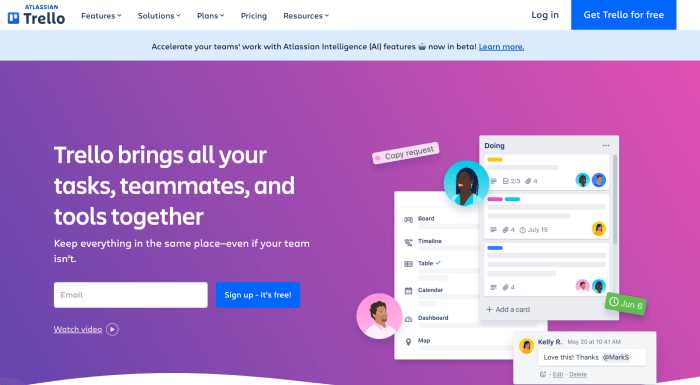
Trello is a visual project management tool that utilizes boards, lists, and cards to help teams organize tasks and projects. Its user-friendly interface makes it an excellent choice for startups looking for straightforward task management without a steep learning curve.
Key Features:
- Kanban Boards: Visualize tasks and workflows easily.
- Customizable Cards: Add checklists, due dates, attachments, and comments.
- Integrations: Connect with various apps like Slack, Google Drive, and more.
- Automation: Use Butler to automate repetitive tasks.
- Mobile Access: Manage projects on the go with mobile apps.
Pricing:
- Free Plan: Basic features with limited integrations.
- Business Class: $12.50/user/month (billed annually) for advanced features and integrations.
- Enterprise: Custom pricing for larger teams with enhanced security and support.
2. Nifty
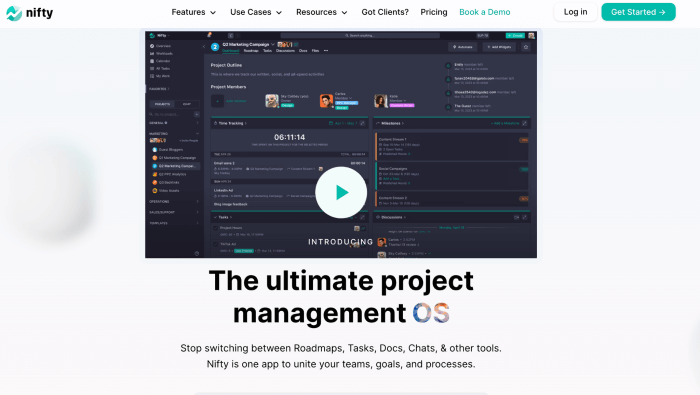
Nifty is a project management and team collaboration tool designed to streamline workflows. It combines task management with documentation and reporting features, making it ideal for startups looking to manage projects and communicate effectively.
Key Features:
- Task Management: Create tasks with deadlines, assignees, and priorities.
- Milestones: Set project milestones to track progress.
- Time Tracking: Monitor time spent on tasks for better resource management.
- Document Sharing: Collaborate on documents within the platform.
- Integrations: Connect with tools like Slack, Google Drive, and more.
Pricing:
- Free Plan: Limited features for small teams.
- Starter Plan: $5/user/month (billed annually) with additional features.
- Pro Plan: $10/user/month (billed annually) for advanced functionalities.
3. Asana
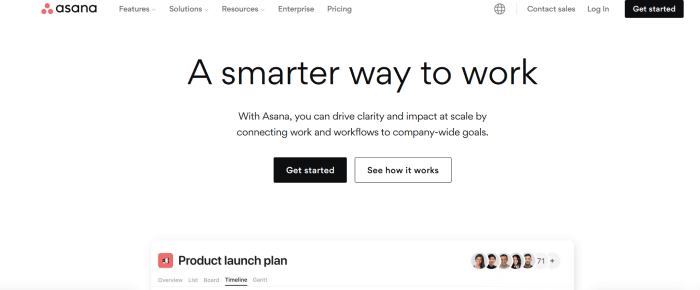
Asana is a powerful project management tool that allows teams to plan, organize, and track work. Its flexibility and robust features make it suitable for startups with complex project needs.
Key Features:
- Task and Subtask Management: Break down projects into manageable tasks.
- Custom Fields: Tailor project views to meet specific needs.
- Timeline View: Visualize project timelines and dependencies.
- Reporting: Generate reports to track project performance and team productivity.
- Integrations: Works with numerous apps including Slack, Dropbox, and more.
Pricing:
- Basic: Free for individuals or teams just getting started.
- Premium: $10.99/user/month (billed annually) for advanced features.
- Business: $24.99/user/month (billed annually) for additional functionalities and reporting.
4. Bonsai
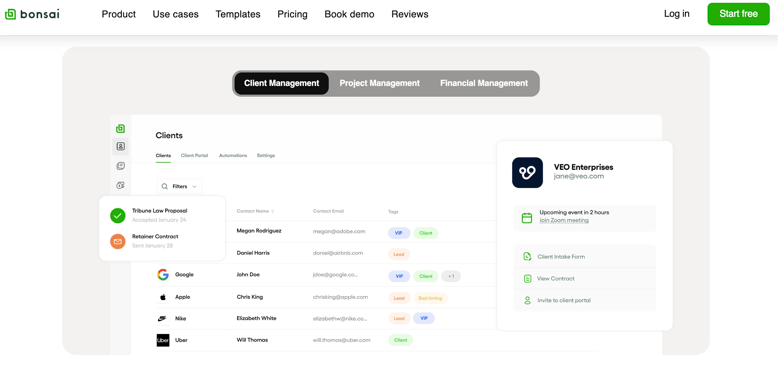
Bonsai is designed specifically for freelancers and small businesses, providing project management alongside invoicing and contract management. It’s ideal for startups that need a comprehensive solution for managing client projects.
Key Features:
- Project Tracking: Monitor project progress and deadlines.
- Invoicing: Create and send invoices directly from the platform.
- Contracts: Generate customizable contracts for clients.
- Time Tracking: Log hours spent on tasks for accurate billing.
- Client Portal: Share project updates and documents with clients.
Pricing:
- Solo Plan: $19/month for freelancers with basic features.
- Team Plan: $29/month for teams needing additional functionalities.
- Business Plan: $49/month for advanced features and client management.
5. ProjectManager.com
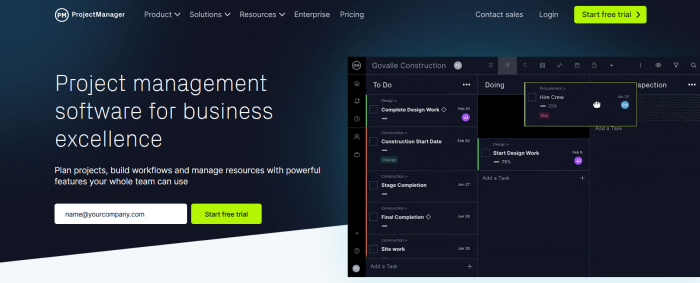
ProjectManager.com is a comprehensive project management software that combines planning, tracking, and reporting in one platform. It’s suitable for startups looking for a robust solution to manage multiple projects simultaneously.
Key Features:
- Gantt Charts: Plan and visualize project timelines and dependencies.
- Task Management: Assign tasks, set deadlines, and track progress.
- Time Tracking: Log hours and manage resources effectively.
- Reporting Tools: Generate detailed reports on project performance.
- Integrations: Connect with various tools like Slack, Google Drive, and more.
Pricing:
- Free Trial: 30-day free trial available.
- Personal Plan: $15/user/month for individual users.
- Team Plan: $25/user/month for small teams.
- Business Plan: $34/user/month for larger teams with advanced features.
Communication Tools For Startup
Clear communication is vital for team collaboration and productivity. In a startup environment, where teams may be remote or hybrid, effective communication tools are essential for keeping everyone connected.
6. Zoom
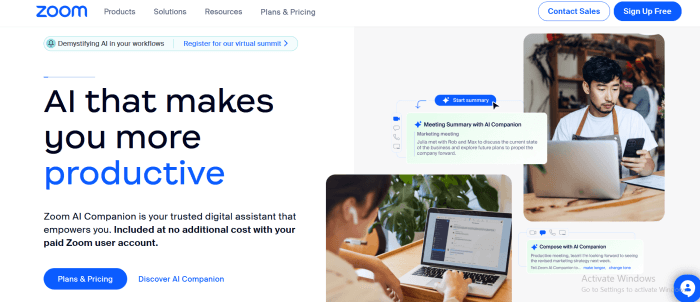
Zoom is a leading video conferencing platform that facilitates virtual meetings, webinars, and team communication. It is widely used for its high-quality video and audio capabilities, making it ideal for remote teams and client interactions.
Key Features:
- High-quality video and audio: Reliable connections for clear communication.
- Screen Sharing: Share your screen during meetings for presentations or collaborative work.
- Breakout Rooms: Divide participants into smaller groups for focused discussions.
- Recording: Record meetings for later review or sharing with team members.
- Integrations: Connect with tools like Slack, Google Calendar, and Microsoft Teams.
Pricing:
- Basic Plan: Free for unlimited one-on-one meetings; 40-minute limit on group meetings.
- Pro Plan: $149.90/year per license for extended meeting duration and additional features.
- Business Plan: $199.90/year per license for more advanced features and support.
Check this out:
Zoom Review: Pricing, Participants, and Performance Compared
7. Microsoft Teams
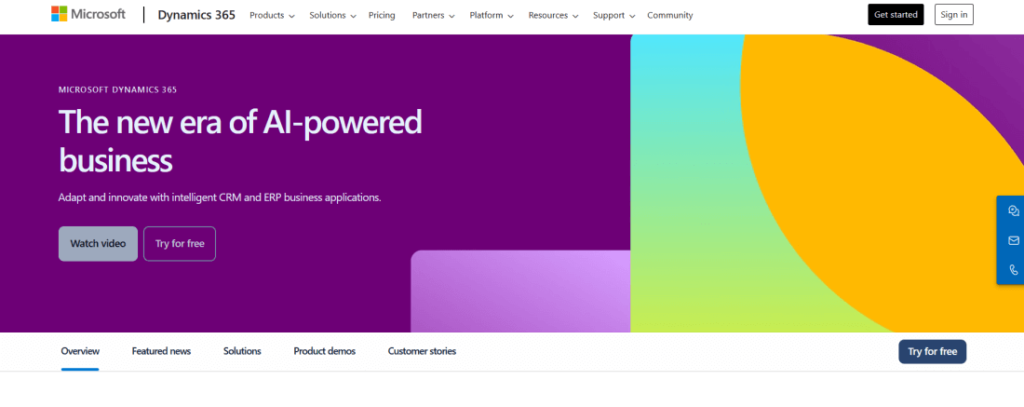
Microsoft Teams is a collaboration platform that combines chat, video conferencing, file sharing, and project management. It integrates seamlessly with Microsoft 365, making it a powerful tool for startups already using Microsoft products.
Key Features:
- Chat and Messaging: Real-time messaging and threaded conversations.
- Video Conferencing: High-quality video calls with up to 10,000 participants.
- File Sharing: Collaborate on documents directly within the app.
- Integration with Microsoft 365: Access to Word, Excel, PowerPoint, and OneNote.
- Customizable Tabs: Add tabs for frequently used apps and services.
Pricing:
- Free Plan: Limited features for small teams.
- Microsoft 365 Business Basic: $6/user/month, includes Teams and other Microsoft apps.
- Microsoft 365 Business Standard: $12.50/user/month for additional features.
8. Slack
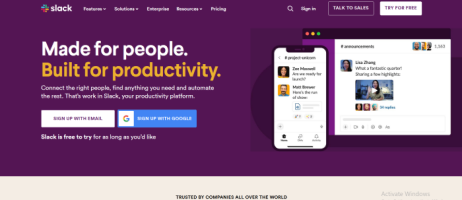
Slack is a versatile messaging platform designed for team collaboration. It allows users to create channels for different topics, share files, and integrate with various tools, making it a staple for startups.
Key Features:
- Channels: Organize conversations by topics or teams.
- Direct Messaging: Communicate privately with team members.
- File Sharing: Easily share documents and files within channels.
- Integrations: Connect with over 2,000 apps, including Google Drive, Trello, and Zoom.
- Search Functionality: Quickly find past messages and files.
Pricing:
- Free Plan: Limited features and message history.
- Pro Plan: $7.25/user/month for advanced features and integrations.
- Business+ Plan: $12.50/user/month for additional security and compliance features.
Also, see:
Slack vs Discord which chat app is better for your team
9. Telegram

Telegram is a cloud-based messaging app known for its speed and security. It allows users to communicate via text, voice, and video, making it suitable for team collaboration.
Key Features:
- Group Chats: Create groups with up to 200,000 members for large teams.
- Channels: Broadcast messages to unlimited audiences.
- File Sharing: Send files up to 2GB in size.
- Secret Chats: End-to-end encryption for secure conversations.
- Bots: Automate tasks and enhance productivity with custom bots.
Pricing:
- Free: Telegram is completely free to use, with no subscription fees.
10. Skype
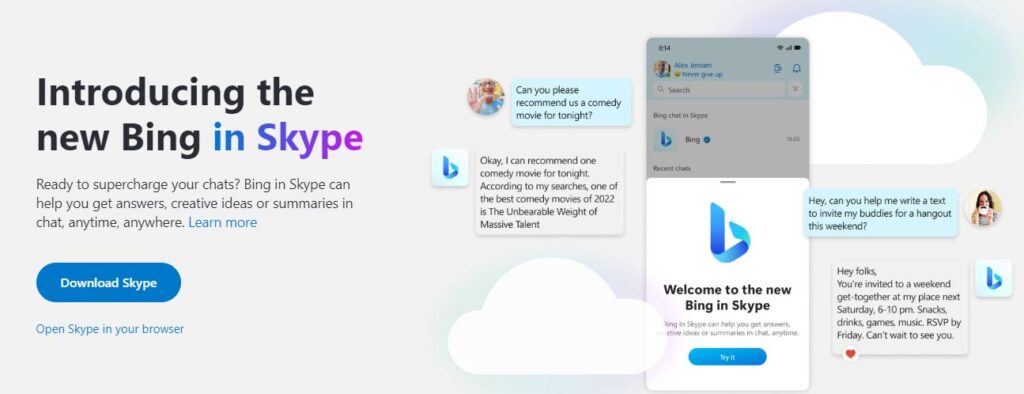
Skype is a well-known communication tool that offers video calling, voice calls, and messaging. It is suitable for startups looking for a straightforward way to connect with team members and clients.
Key Features:
- Video and Voice Calls: High-quality calls with up to 50 participants.
- Instant Messaging: Send text messages and share files during calls.
- Screen Sharing: Share your screen for presentations or collaborative work.
- Call Recording: Record calls for future reference.
- Integration with Microsoft Products: Works well with other Microsoft applications.
Pricing:
- Free: Basic features for individual users.
- Skype for Business: Part of Microsoft 365 plans with additional features.
11. WhatsApp

WhatsApp is a widely used messaging app that allows users to send messages, make voice and video calls, and share files. It is popular among startups for its ease of use and accessibility.
Key Features:
- Instant Messaging: Send text messages and voice notes.
- Voice and Video Calls: High-quality calls over the internet.
- Group Chats: Communicate with multiple team members at once.
- File Sharing: Share images, documents, and other files easily.
- End-to-End Encryption: Ensures secure communication.
Pricing:
- Free: WhatsApp is free to use, with no subscription fees.
Financial Management Tools for Startup
Effective financial management is crucial for startups to ensure sustainability and growth. Proper tracking of expenses, revenues, and cash flow helps startups make informed decisions.
11. QuickBooks
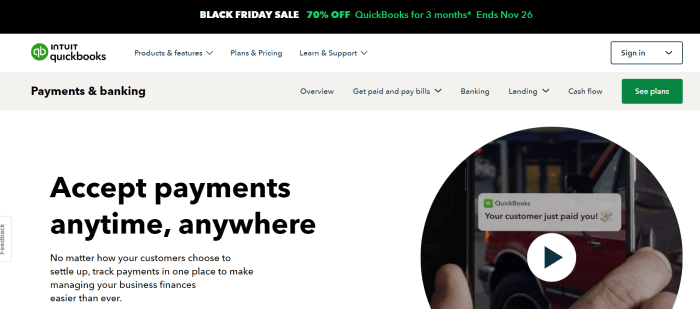
QuickBooks is a comprehensive accounting software designed for small to medium-sized businesses. It offers a suite of tools for managing finances, including bookkeeping, invoicing, payroll, and expense tracking. QuickBooks is known for its user-friendly interface and robust features, making it a popular choice among startups.
Key Features:
- Automated Bookkeeping: Automatically tracks income and expenses.
- Invoicing: Create and send customized invoices easily.
- Expense Tracking: Capture and categorize expenses in real time.
- Financial Reporting: Generate reports such as profit and loss statements, balance sheets, and cash flow statements.
- Multi-Device Access: Access financial data from any device, including mobile.
Pricing:
- Simple Start: $25/month for basic features.
- Essentials: $50/month for additional users and features.
- Plus: $80/month for project tracking and inventory management.
12. FreshBooks
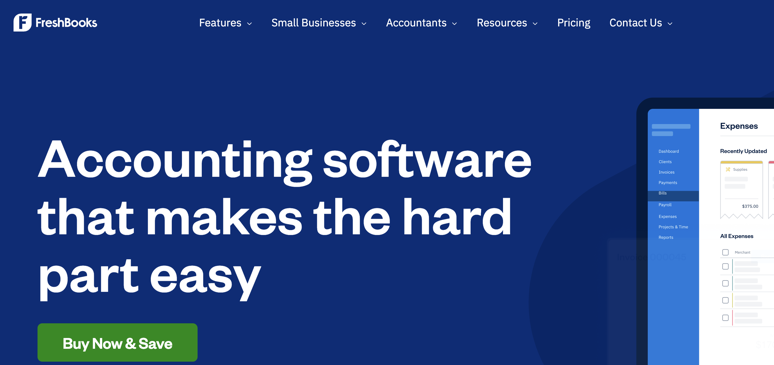
FreshBooks is an accounting software designed for small businesses and freelancers. It focuses on invoicing and expense tracking, providing a simple and intuitive platform for managing finances. FreshBooks is particularly well-suited for service-based businesses.
Key Features:
- Custom Invoicing: Create professional invoices with branding options.
- Expense Tracking: Easily log expenses and attach receipts.
- Time Tracking: Track billable hours for accurate invoicing.
- Client Portal: This allows clients to view invoices and make payments online.
- Reporting: Access financial reports to monitor business performance.
Pricing:
- Lite: $15/month for basic invoicing and expense tracking.
- Plus: $25/month for additional features and clients.
- Premium: $50/month for advanced reporting and unlimited clients.
13. Xero

Xero is a cloud-based accounting software that provides a comprehensive solution for managing finances. It is designed for small to medium-sized businesses and offers features for invoicing, bank reconciliation, and financial reporting.
Key Features:
- Bank Reconciliation: Automatically import and categorize bank transactions.
- Invoicing: Create and send invoices with customizable templates.
- Expense Claims: Manage employee expense claims easily.
- Inventory Management: Track inventory levels and manage stock.
- Multi-Currency Support: Handle transactions in multiple currencies.
Pricing:
- Starter: $20/month for basic features and limited transactions.
- Standard: $30/month for additional features and unlimited transactions.
- Premium: $40/month for advanced features and multi-currency support.
14. Plooto

Plooto is a payment processing and accounts payable solution designed for small businesses. It simplifies the payment process, allowing startups to manage outgoing payments and invoicing efficiently.
Key Features:
- Automated Payments: Schedule and automate payments to vendors.
- Invoice Management: Create and send invoices directly through the platform.
- Bank Integration: Sync with bank accounts for easy reconciliation.
- Payment Tracking: Monitor payment statuses in real-time.
- Multi-Currency Support: Facilitate international transactions with ease.
Pricing:
- Monthly Fee: $25/month plus transaction fees.
- Pay-as-You-Go: Transaction fees apply without a monthly subscription.
15. Gusto
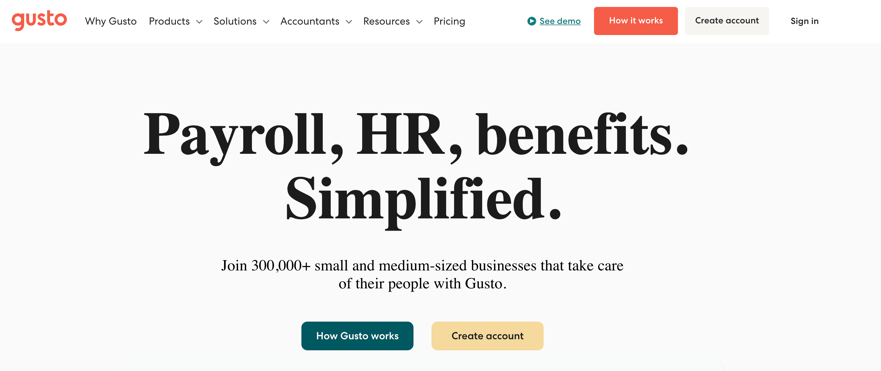
Gusto is a payroll and HR management platform designed for small businesses. It simplifies payroll processing, employee benefits, and compliance, making it easier for startups to manage their workforce.
Key Features:
- Automated Payroll: Calculate and process payroll automatically.
- Employee Benefits: Manage health insurance, retirement plans, and other benefits.
- Tax Filing: Automatically file payroll taxes and generate tax forms.
- Employee Self-Service: Allow employees to access pay stubs and tax documents online.
- Time Tracking: Integrate time tracking for accurate payroll calculations.
Pricing:
- Core Plan: $39/month plus $6 per employee for basic payroll features.
- Complete Plan: $39/month plus $12 per employee for additional HR features.
- Concierge Plan: $149/month plus $12 per employee for full-service HR support.
16. Expensify
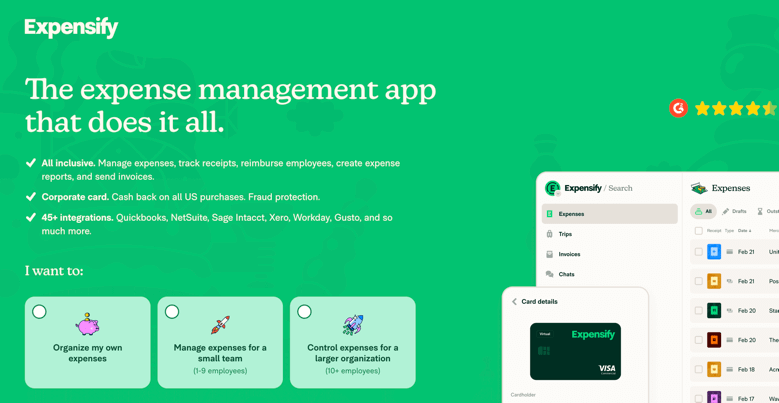
Expensify is an expense management tool that helps businesses track receipts and manage expenses efficiently. It is particularly useful for startups looking to streamline their expense reporting processes.
Key Features:
- Receipt Scanning: Use mobile devices to scan and upload receipts.
- Expense Reporting: Automatically generate expense reports for easy submission.
- Integrations: Connect with accounting software like QuickBooks and Xero.
- Multi-Currency Support: Handle expenses in different currencies.
- Approval Workflows: Set up approval processes for expense claims.
Pricing:
- Free Plan: Basic features for individual users.
- Team Plan: $5 per user/month for small teams.
- Business Plan: $9 per user/month for advanced features and reporting.
Marketing Tools For Startup
Marketing is essential for building brand awareness and acquiring customers. Startups must utilize effective marketing tools to maximize their reach and engagement.
17. Buffer
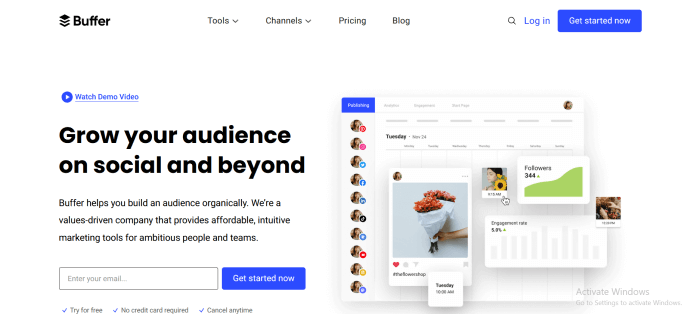
Buffer is a social media management platform that allows startups to schedule, publish, and analyze content across multiple social networks. It simplifies the process of maintaining a consistent social media presence.
Key Features:
- Social Media Scheduling: Schedule posts in advance for optimal timing.
- Analytics: Track engagement, reach, and performance of social media content.
- Team Collaboration: Invite team members to contribute and manage social media accounts.
- Browser Extensions: Easily share content from any website directly to Buffer.
- Mobile Apps: Manage social media on the go with iOS and Android apps.
Pricing:
- Free Plan: Limited features and 3 social media accounts.
- Pro Plan: $15/month for more features and 8 social media accounts.
- Business Plan: $99/month for additional team members and analytics.
18. Mailchimp

Mailchimp is a comprehensive email marketing platform that helps startups create, send, and track email campaigns. It offers a user-friendly interface and a range of templates to make email marketing accessible for businesses of all sizes.
Key Features:
- Email Templates: Choose from a variety of pre-designed templates or create custom designs.
- Automation: Set up automated email sequences based on user actions.
- Audience Management: Segment and manage subscriber lists effectively.
- Analytics: Track open rates, click-through rates, and campaign performance.
- Integrations: Connect with various tools like e-commerce platforms and CRMs.
Pricing:
- Free Plan: Up to 2,000 subscribers and 10,000 sends per month.
- Essentials Plan: $9.99/month for more features and higher sending limits.
- Standard Plan: $14.99/month for advanced features like A/B testing and retargeting ads.
19. SendGrid
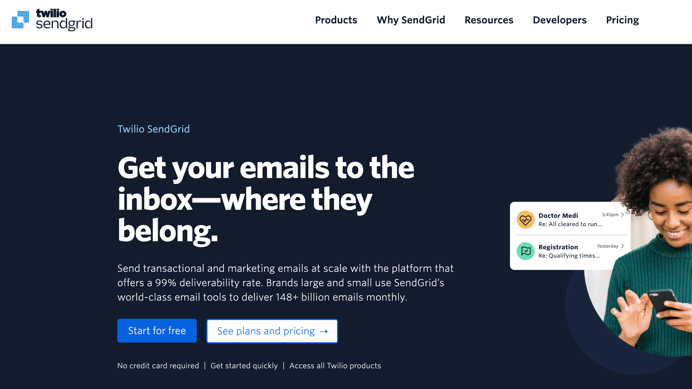
SendGrid is a cloud-based email delivery platform that helps startups reliably send transactional and marketing emails. It offers a robust infrastructure and deliverability features to ensure that emails reach their intended recipients.
Key Features:
- Email Delivery: Reliable email delivery with high deliverability rates.
- Email APIs: Integrate email functionality directly into applications.
- Email Analytics: Track email opens, clicks, and bounces.
- Email Templates: Create and customize email templates easily.
- Scalability: Handles high email volumes as your startup grows.
Pricing:
- Free Plan: Up to 100 emails per day and basic features.
- Essentials Plan: Starts at $14.95/month for higher sending limits and additional features.
- Pro Plan: Starts at $89.95/month for enterprise-level features and support.
20. Google Analytics

Google Analytics is a free web analytics service that provides startups with valuable insights into their website traffic, user behavior, and marketing performance. It helps startups make data-driven decisions to optimize their online presence.
Key Features:
- Traffic Reporting: Track website visitors, sources, and user demographics.
- Conversion Tracking: Monitor goal completions and e-commerce transactions.
- Custom Reporting: Create tailored reports to track specific metrics.
- Audience Segmentation: Analyze user segments based on behavior and interests.
- Integration with Google Ads: Measure the effectiveness of paid campaigns.
Pricing:
- Free for all users
21. Ahrefs

Ahrefs is an all-in-one SEO tool that helps startups improve their search engine rankings. It provides comprehensive data on backlinks, keyword rankings, and content performance to help startups develop effective SEO strategies.
Key Features:
- Backlink Analysis: Discover your website’s backlink profile and monitor competitors.
- Keyword Research: Find relevant keywords with high search volume and low competition.
- Site Audit: Identify technical SEO issues and opportunities for improvement.
- Content Gap Analysis: Discover content topics that your competitors rank for but you don’t.
- Rank Tracking: Monitor keyword rankings and track search engine visibility over time.
Pricing:
- Lite Plan: $99/month for limited features and usage.
- Standard Plan: $199/month for more features and higher usage limits.
- Advanced Plan: $399/month for enterprise-level features and support.
22. Canva
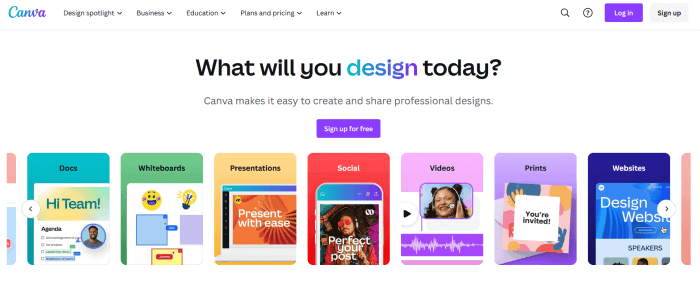
Canva is a user-friendly graphic design tool that allows startups to create visually appealing content without the need for professional design skills. It offers a wide range of templates, design elements, and tools to help startups create social media graphics, presentations, and marketing materials.
Key Features:
- Drag-and-Drop Interface: Easily create designs using a simple interface.
- Templates: Choose from thousands of pre-designed templates for various purposes.
- Brand Kit: Store brand assets like logos, colors, and fonts for consistent branding.
- Team Collaboration: Invite team members to collaborate on designs.
- Photo Editing: Basic photo editing tools to enhance images.
Pricing:
- Free Plan: Limited features and templates.
- Pro Plan: $12.99/month for additional templates, brand kits, and team collaboration features.
- Enterprise Plan: Custom pricing for larger teams and advanced features.
Customer Relationship Management (CRM) Tools
A strong customer relationship is vital for startup success. CRM tools help startups manage interactions with customers, streamline processes, and improve customer satisfaction.
23. HubSpot
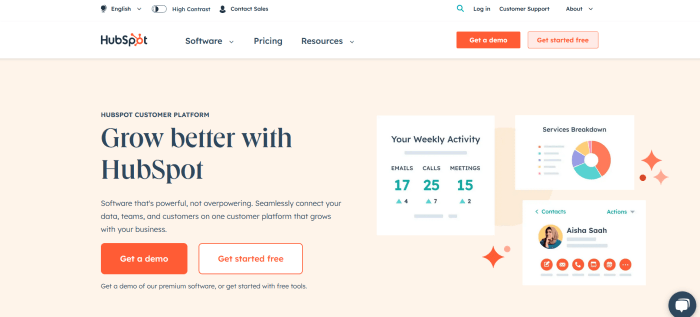
HubSpot CRM is a powerful, user-friendly platform designed to help startups manage customer relationships and sales processes. It offers a free tier with essential features, making it an attractive option for startups looking to scale without significant upfront costs.
Key Features:
- Contact Management: Store and manage customer information in one place.
- Email Tracking: Track email opens and clicks to gauge engagement.
- Sales Pipeline Management: Visualize and manage sales processes with customizable pipelines.
- Reporting and Analytics: Generate reports to analyze sales performance and customer interactions.
- Integration: Seamlessly connect with other HubSpot tools and third-party applications.
Pricing:
- Free Plan: Basic CRM features with unlimited users.
- Starter Plan: $50/month for additional features like email marketing and reporting.
- Professional Plan: $500/month for advanced automation and analytics.
24. Zoho CRM
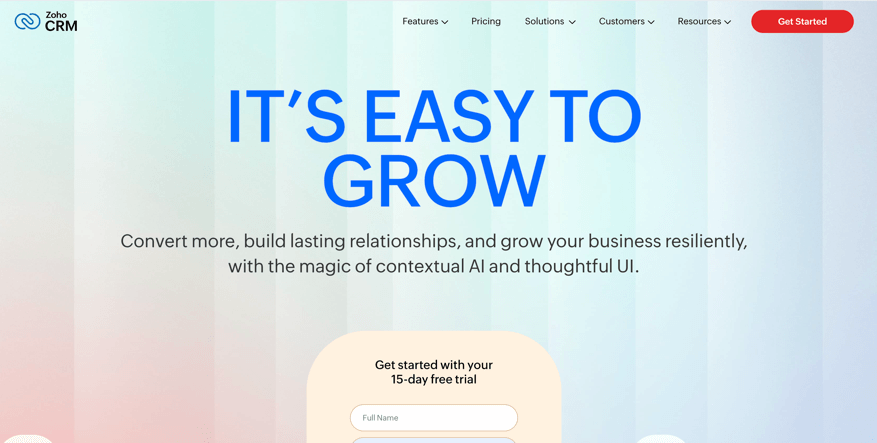
Zoho CRM is a comprehensive CRM solution designed for small to medium-sized businesses. It offers a wide range of features to help startups manage their sales processes, customer interactions, and marketing campaigns efficiently.
Key Features:
- Lead Management: Capture and nurture leads through various channels.
- Sales Automation: Automate repetitive tasks to streamline sales processes.
- Customization: Tailor the CRM to fit specific business needs with customizable fields and modules.
- Multi-Channel Communication: Engage customers through email, phone, chat, and social media.
- Analytics and Reporting: Access detailed reports and dashboards to track performance.
Pricing:
- Free Plan: Limited to 3 users with basic features.
- Standard Plan: $14/user/month for additional features.
- Professional Plan: $23/user/month for advanced functionalities.
25. Bitrix24
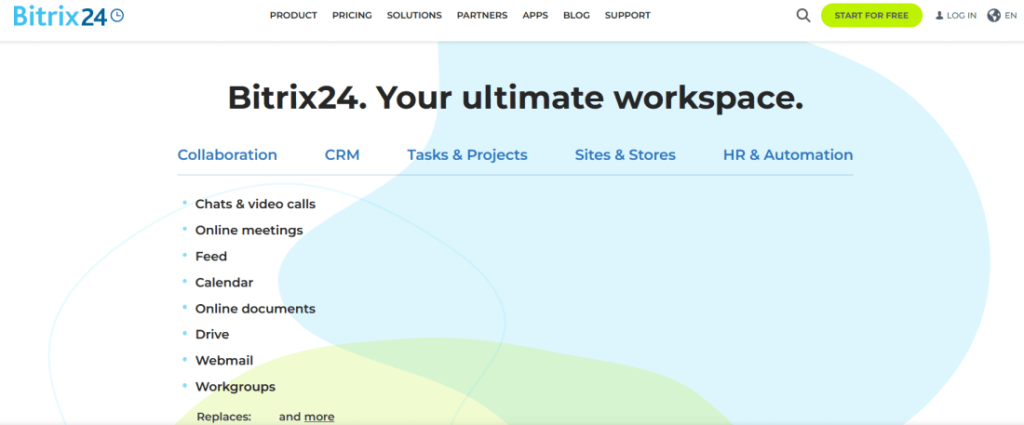
Bitrix24 is a versatile CRM and collaboration platform that provides startups with tools for managing customer relationships, projects, and team communication. It offers a free plan with essential features, making it accessible for startups on a budget.
Key Features:
- Contact Management: Organize and manage customer data effectively.
- Task and Project Management: Collaborate on projects with built-in task management tools.
- Communication Tools: Use chat, video calls, and email integration for seamless communication.
- Sales Automation: Automate sales processes and follow-ups.
- Reporting and Analytics: Generate reports to analyze sales activities and customer interactions.
Pricing:
- Free Plan: Basic features for up to 12 users.
- Basic Plan: $39/month for 5 users with additional features.
- Standard Plan: $99/month for 50 users with advanced capabilities.
26. Freshworks CRM
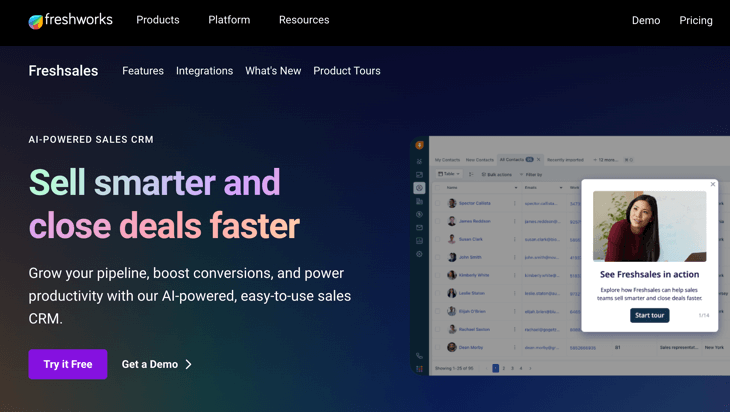
Freshworks CRM (formerly Freshsales) is an AI-powered CRM designed for startups and small businesses. It provides a user-friendly interface and a range of features to help manage customer relationships and sales processes effectively.
Key Features:
- Lead Scoring: Automatically prioritize leads based on engagement and behavior.
- Sales Pipeline Management: Visualize sales stages and manage deals efficiently.
- Email Tracking: Monitor email interactions and schedule follow-ups.
- AI Insights: Leverage AI-driven insights to improve sales strategies.
- Integration: Connect with various third-party applications for enhanced functionality.
Pricing:
- Free Plan: Basic CRM features for unlimited users.
- Growth Plan: $15/user/month for additional features and automation.
- Pro Plan: $39/user/month for advanced reporting and AI capabilities.
Factors to Consider When Selecting Tools
- Budget Constraints: Startups often operate with limited budgets, so it’s essential to choose tools that offer value for money.
- Scalability: As startups grow, their needs will evolve. Selecting tools that can scale with the business is crucial for long-term success.
- User-Friendliness: Tools should be intuitive and easy to use, minimizing the learning curve for team members.
Tips for Trialing and Evaluating Tools
- Take Advantage of Free Trials: Most tools offer free trials or freemium versions. Use these to assess the tool’s features and usability before committing.
- Gather Team Feedback: Involve team members in the evaluation process. Their insights can help identify which tools best meet the team’s needs.
- Assess Customer Support: Reliable customer support can be a game-changer, especially for startups that may need assistance during implementation.
Conclusion
From project management and communication to financial tracking and marketing, the right startup tools can significantly impact a startup’s success.
By understanding the unique needs of your startup and selecting tools that address those needs, you can streamline operations, enhance collaboration, and drive growth. As you embark on your startup journey, explore the various tools available, trial them, and adapt them to fit your business model.
The right combination of tools can empower your team to innovate, adapt, and thrive in a challenging environment.
By investing time in selecting the right tools, you set the foundation for a successful startup journey. Embrace the possibilities that technology offers, and watch your startup flourish.
You May Also Like:





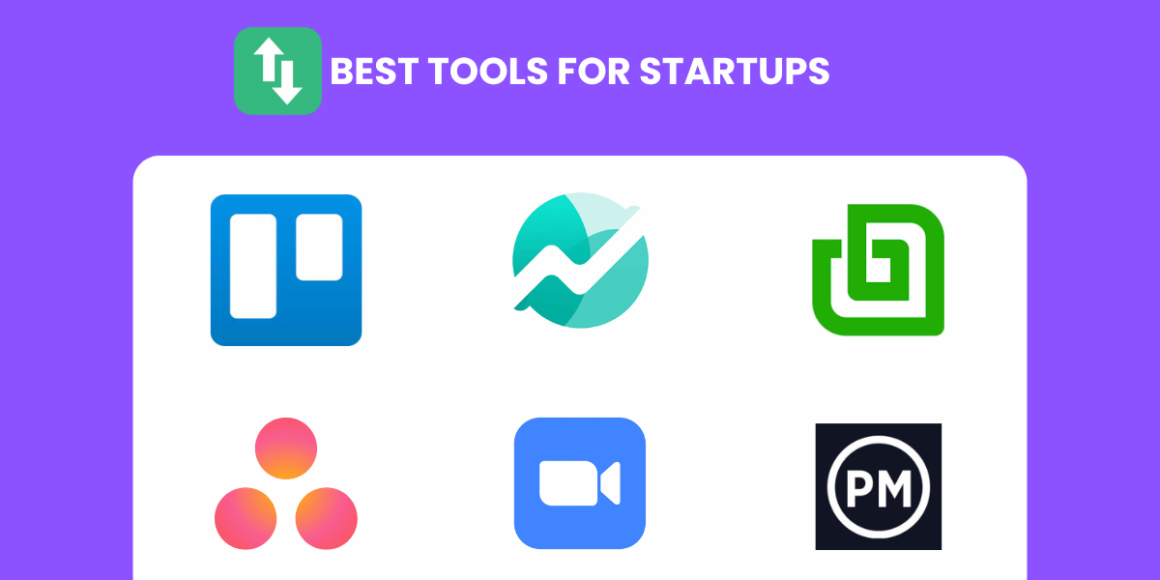



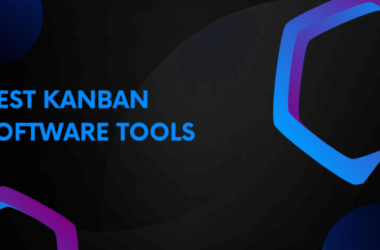

1 comment